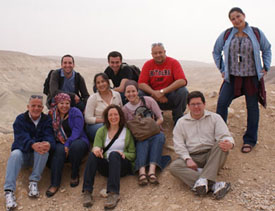Exchange with Ben-Gurion University focuses on services for children and families
An hour after Cindy Lou Cuesta arrived in Beer-Sheva last March with seven other Rutgers law students to participate in an exchange program with Ben-Gurion University, air-raid sirens blared and rockets began to fall.
Although she grew up in what she describes as a “rough neighborhood” in Jersey City, nothing prepared Cuesta for the experience.
“I was used to gunshots, but to hear a rocket … that’s overwhelming,” says Cuesta, who attends evening classes at Rutgers School of Law School in Newark while working full time for a Manhattan-based nonprofit. “The Israeli students and professors were calm; they just rolled with it, giving us options if we didn’t feel safe in student housing. They were very much attuned to the emotional temperature of our group.”
Trip organizers repeatedly offered the American law students the opportunity to return home, says Jennifer Rosen Valverde, clinical professor of law at Rutgers-Newark and the key partner on the U.S. end. All chose to stay, as much to learn about the texture of daily life in Israel as to examine the Israeli approach to jurisprudence and children’s advocacy.
“The program fosters comparative study, increases cultural awareness and forges partnerships which prove invaluable as we teach and shape our future leaders,” Valverde says.
Safely out of range of the weapons -- part of a barrage of rockets marking ongoing hostilities between Israelis and Palestinians -- the Americans met with community members in and around the southern Israeli city, and toured a variety of agencies focused on children and families.

The atmosphere was considerably less dramatic when four Israeli students arrived in the United States the week of October 7 to study American social justice, interact with their Rutgers counterparts and complete the second half of the exchange.
Among other venues in New Jersey, the students visited Montclair public schools, the Rocking Horse rehabilitation center in West Orange and a Paterson facility known as Eva’s Village, a nonprofit social service agency dedicated to fighting poverty and homelessness.
The arrangement was born when the Israeli university issued a request for proposals from New York-area law schools last November and Rutgers was chosen as a partner, Valverde says. The goal for the Americans was to get a firsthand look at services Israel provides to the indigent, the marginalized and the underserved, such as the Bedouin community and immigrant populations, including those from Russia and Ethiopia.
Although security issues curtailed the agenda in Israel, Cuesta says she was inspired by what she learned during her six-day stay. The students attended child advocacy lectures and observed programs dealing with children’s rights that provided ideas for bringing a model for a meaningful neighborhood-based program to Newark in the future.
Cuesta credits her Israeli hosts and the trip’s organizers with helping the exchange succeed, despite difficult circumstances. “When the rockets started falling, they comforted us and stayed flexible with our itinerary and our plans. Being able to experience that kind of warmth and camaraderie led to friendships I will hold dear for the rest of my life,” Cuesta says.
Ma’ayan Arbiv, who arrived in Newark last week after a 12-hour flight, says she and her fellow BGU students originally worried that the turmoil would spoil the program for the Americans. But their fears were quickly stilled.
“For us, rockets are a much more common occurrence, but we don’t get that scared because the media makes more of it than it is,” says Arbiv, a second-year major in health systems management and one of the coordinators on the Israeli side. “We knew we could handle it -- we know where to go and what to do -- but we were afraid it would ruin their experience. But they were pretty brave; they didn’t scare easily. So they experienced what we experience every day and saw what we live with,” says Arbiv, a resident of Ashkelon.
Valverde credits Richard Isralowitz, a professor of social work at BGU and a former visiting professor at Rutgers, with pioneering the exchange program, and praises the Israeli university’s Community Action Program for serving as the primary partner.
The social justice initiative gives students free housing in apartments in the most socio-economically challenged neighborhoods of Beer-Sheva. In return, each participant offers eight to 10 hours of educational, social and other assistance to neighborhood residents.